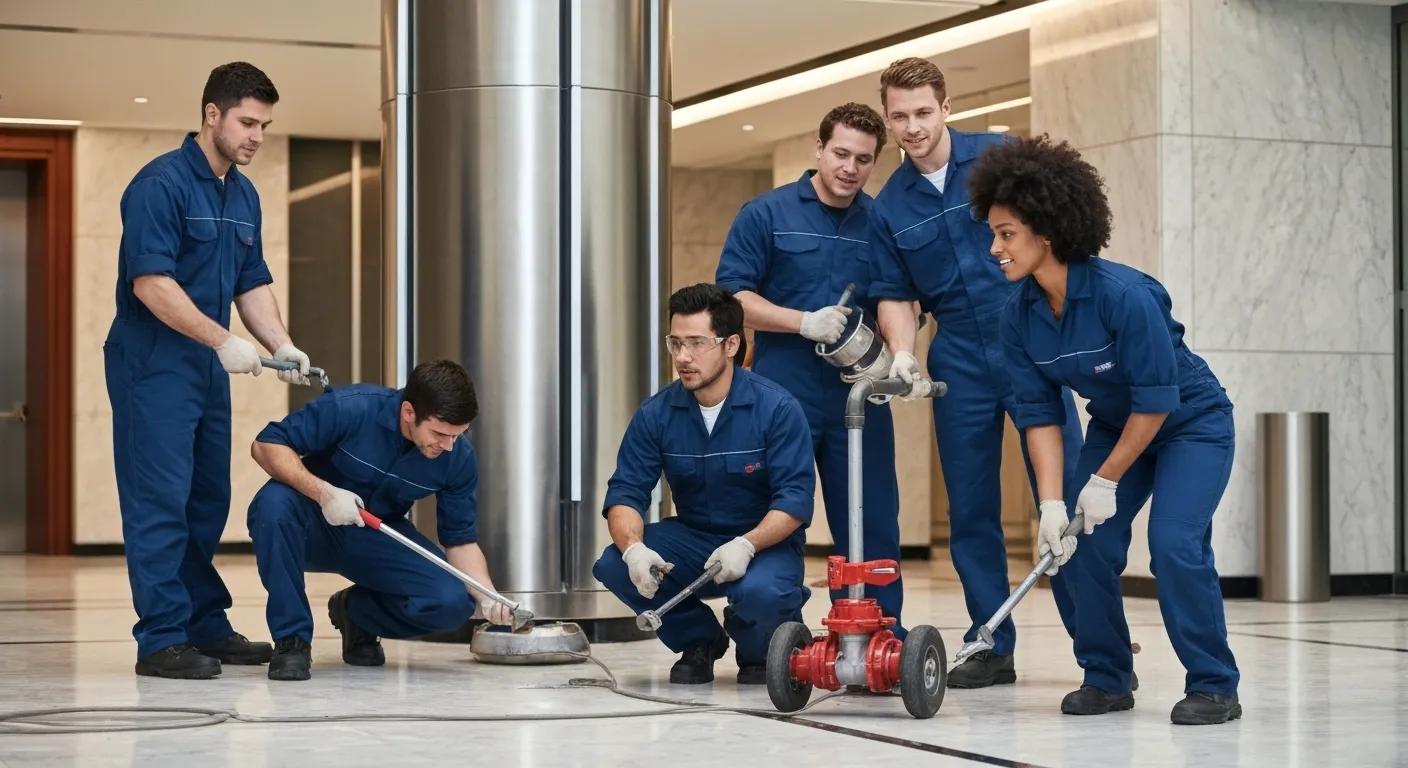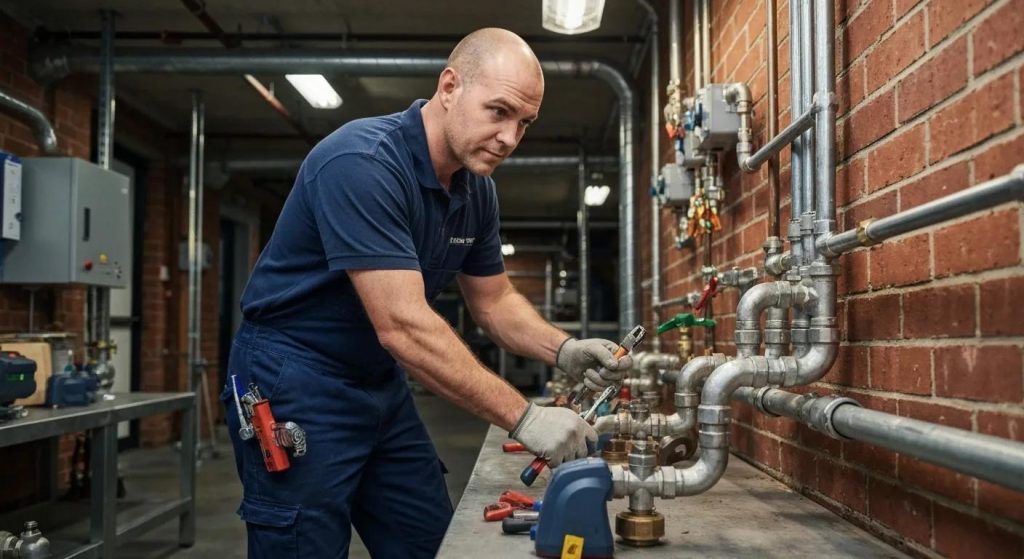Why Businesses Choose 24 Seven for 24 Hour Plumbing Services
Why Businesses Trust 24 Seven Plumbing for 24 Hour Commercial Plumbing in Sydney
Commercial plumbing failures can shut a business down in minutes, costing revenue, reputation and staff productivity; for that reason, rapid, reliable commercial plumbing response is essential for Sydney businesses. This guide explains why firms prioritise proven 24-hour commercial plumbing Sydney capabilities, how emergency commercial plumbing solutions work, and what operational practices reduce downtime and expenditure. Readers will learn the core trust signals that matter when selecting a 24/7 commercial plumber in Sydney, the specific commercial services required by high-usage sites, and how preventative maintenance and compliance reduce emergency calls, helping you manage your operational expenditure. The piece covers which technical tools—CCTV drain inspection, hydro-jetting, RPZ valve testing— and service types—commercial blocked drains, commercial hot water repair, commercial gas fitting—deliver measurable business outcomes, providing excellent value. After outlining problem-solution workflows for emergencies and blocked drains, this guide details maintenance contract tiers and explains how proactive backflow prevention protects operations.
What Makes 24 Seven Plumbing the Trusted 24 Hour Commercial Plumber in Sydney?
Trust for emergency commercial plumbing rests on predictable availability, transparent financial arrangements, certified workmanship, and modern diagnostic capability; these elements together limit downtime and financial risk. Availability means an organised on-call roster and escalation workflow that turns a reported burst pipe or gas leak into immediate containment and remediation, reducing hours of lost trading. Our transparent financial outlines and commitment to quality create financial predictability and reduce concerns after emergency work, which is vital for commercial managers. Use of CCTV drain inspection and hydro-jetting as diagnostic and repair tools speeds accurate repairs and prevents recurrence, while industry association membership signals adherence to professional standards. These trust signals directly address the commercial priorities of downtime, compliance and predictable expenditure management.
- 24/7 availability, including emergencies and public holiday coverage.
- Clear financial outlines and our commitment to quality to reduce billing concerns.
- Licensed and accredited plumbers for specialised systems and valves.
- On-site diagnostic tools such as CCTV inspection and hydro-jetting for fast fixes.
These trust factors lead naturally to how round-the-clock availability is operationalised and scheduled for rapid response.
How Does 24 Seven Ensure 24/7 Emergency Commercial Plumbing Availability?

24/7 emergency commercial plumbing availability is created through scheduled on-call rostering, triage protocols and rapid dispatch that transform a reported fault into immediate action and containment. The mechanism begins with centralised job intake and prioritisation, then dispatches an accredited technician with the appropriate tools—CCTV camera, hydro-jetter or gas detection kit—so diagnosis and temporary containment occur on first call. This workflow reduces exposure to extended downtime and reputation loss for businesses by stopping leaks, isolating gas, or creating bypasses while a permanent repair plan is quoted. Operational readiness during nights and public holidays ensures continuity, and a clear escalation path transfers complex jobs to specialists without delaying containment. Maintaining this readiness underpins the next topic: why predictable financial outlines and our commitment to quality matter for commercial expenditure management.
Why Are Clear Financial Outlines and Our Commitment to Quality Important for Sydney Businesses?
Clear financial outlines and our commitment to quality transform emergency spending from uncertain to predictable, helping commercial operators manage their budgets and approve urgent repairs without delay. The reason this matters is that ad-hoc hourly pricing can delay approvals and extend downtime, whereas a clear financial outline allows managers to weigh value against lost trading minutes and sign off quickly. Our commitment to quality reduces post-job disputes and ensures corrective follow-up when a repair fails to meet performance expectations, safeguarding supply continuity. For businesses with multiple sites or strata responsibilities, this predictability simplifies accounting and risk transfer. Having certainty in expenditure leads to the final trust pillar: accredited qualifications and how they ensure compliant, safe work.
What Qualifications and Experience Do 24 Seven’s Licensed Plumbers Have?
Licensed plumbers with specialised accreditations are essential for safe, compliant commercial plumbing work; accredited skills for Thermostatic Mixing Valves, RPZ valves and sewer and pipe works reduce liability and meet regulatory expectations. These qualifications allow technicians to perform backflow prevention testing, gas appliance installations and complex hot water system repairs within NSW codes, which lowers inspection risk for businesses. Membership of industry bodies further signals adherence to recognised standards and continuous professional development. Accredited experience with commercial systems also means faster diagnosis on-site, because technicians understand system mapping and failure modes common in hospitality and retail settings. Understanding these credentials sets up the services that apply these capabilities across commercial sites.
Which Commercial Plumbing Services Does 24 Seven Offer to Sydney Businesses?
Commercial plumbing services for businesses include emergency interventions, drainage works, hot water systems, gas plumbing and preventative maintenance; each service uses specific tools and delivers distinct operational benefits. We combine immediate containment steps with diagnostic methods such as CCTV, drain inspection and hydro-jetting to convert a reactive job into a reliable repair that reduces repeat failures. The table below compares common commercial services with their primary features and the direct business benefits to help decision-makers scan options.
This service comparison helps businesses prioritise interventions, and the following subsections explain how each service is executed and why the methods matter.
- 24-hour commercial plumbing in Sydney: Emergency triage, temporary containment, and transparently priced permanent repairs.
- Commercial blocked drains: CCTV to locate blockage, hydro-jetting for grease and scale removal, and relining where needed.
- Commercial hot water system services: Diagnosis of tanked versus tankless systems, element and thermostat repair, and replacement planning.
- Commercial gas installations: Leak detection, emergency isolation, certified fitting and safety testing.
How Does 24 Seven Handle Emergency Commercial Plumbing Repairs?
Emergency commercial plumbing repairs begin with triage: assess safety risks, isolate affected systems, and apply temporary containment to keep operations running while a repair plan is prepared. Technicians use CCTV inspection or pressure testing early in the visit to pinpoint the fault and avoid unnecessary excavation or destructive testing. After diagnosis, a clear financial outline for permanent repair is provided, removing uncertainty and enabling quick managerial sign-off so work proceeds without unnecessary delays. The workflow balances containment and permanent remediation to restore full functionality quickly and with documented outcomes.
What Solutions Are Provided for Commercial Blocked Drains in Sydney?
Commercial blocked drains are addressed using staged diagnostics and escalating interventions: start with CCTV drain inspection to locate and characterise the blockage, then select hydro-jetting for greasy scale and high-pressure flushing for complex buildups. Mechanical rodding can provide a temporary clearance in low-complexity cases, while pipe relining or replacement offers longer-term remediation where structural defects exist. Choosing the correct method reduces recurrence and minimises disruptions to trading, and using CCTV beforehand ensures the solution targets the root cause. This diagnostic-first approach transitions into how hot water systems are assessed and maintained.
How Are Commercial Hot Water Systems Repaired and Maintained?
Commercial hot water systems—tanked, tankless and boilers—suffer common faults like failed elements, thermostat issues, or leaks that reduce service capacity; technicians diagnose by system type and load profile before recommending repair or replacement. Preventive servicing includes element checks, pressure and thermostat calibration, and ensuring thermostatic mixing valves are functioning to meet safety and temperature control requirements. For high-demand sites, capacity assessments and staged replacement to higher-efficiency units can deliver operational resilience and energy savings. Proper servicing cadence prevents unexpected failures and links directly to the maintenance agreement benefits described next.
What Commercial Gas Plumbing Services Are Available?
Commercial gas plumbing services encompass gas leak detection, emergency isolation, appliance installation and compliance testing that together preserve safety and legal compliance for commercial kitchens and plant rooms. Immediate safety steps include isolating the supply and using calibrated detection equipment to locate leaks before any repair is attempted, followed by certified installation or repair of appliances to statutory standards. Post-work testing and certification provide the documentation businesses need for safety audits and insurance requirements. Safe gas practice leads naturally into common commercial challenges that prompt many of these interventions.
What Common Commercial Plumbing Challenges in Sydney Does 24 Seven Solve?
Common commercial plumbing challenges include blocked drains from high grease loads, burst pipes in complex risers, water pressure distribution issues, and backflow risks that threaten potable supply; each problem requires both emergency containment and a longer-term remediation plan. High-usage sites accelerate wear and scale accumulation in drains and hot water systems, producing recurring failures unless addressed by maintenance and targeted upgrades. Rapid containment—isolating sections, temporary bypasses and emergency pipe clamps—prevents immediate closure, while permanent options like relining, pump adjustments, or pressure-reducing valves restore reliability. Addressing these challenges also requires compliance with NSW codes and certified testing to avoid administrative or public health penalties. These common problems each demand a specific remedial toolkit and planned maintenance to avoid repetition.
- Blocked drains caused by grease and solids require CCTV diagnosis and hydro-jetting.
- Burst pipes need immediate isolation and temporary bypass before permanent repair.
- Water pressure problems may need pressure-reducing valves or pump reconfiguration.
These scenario-specific responses feed into how large, complex systems are assessed and managed to prevent recurring emergencies.
How Does 24 Seven Manage High-Usage and Complex Plumbing Systems?
Managing high-usage and complex plumbing systems starts with a system audit and capacity assessment to map risers, isolation points and critical assets so interventions are staged rather than disruptive. Staged remediation allows parts of a system to remain operational while repairs or upgrades occur, preserving trading continuity in multi-tenant or hospitality environments. Technical teams prioritise interventions that reduce the probability of repeat emergencies, such as upgrading pipework prone to corrosion or increasing drain capacity where grease is recurrent. Documented system maps and scheduled maintenance can then reduce the frequency and severity of future calls, which links directly to maintenance agreements outlined later.
What Are the Solutions for Blocked Drains, Burst Pipes, and Water Pressure Issues?
Immediate containment for blocked drains and burst pipes focuses on isolating flow and creating temporary bypasses to maintain critical services while diagnostic work proceeds, thereby avoiding a complete shutdown. Permanent repairs include pipe relining, replacement of compromised risers, and installation of pressure-regulating devices or booster pumps to stabilise distribution. Hydro-jetting combined with targeted relining provides a long-term remedy for recurring drain blockages by removing scale and sealing defects without full excavation. These technical solutions reduce emergency frequency and set the stage for formal preventative maintenance programs.
How Does 24 Seven Ensure Compliance with Sydney Plumbing Regulations?
Compliance is achieved through licensed staff performing accredited services, issuing required certificates and following the Plumbing Code and NSW-specific requirements for backflow, gas and hot water systems. Regular RPZ testing and documented reporting demonstrate adherence to potable water safety rules, while certified gas work ensures legal appliance installation and safe operation. Clear documentation provided after works reduces business liability and simplifies audit processes for building managers and strata committees. Maintaining compliance reduces operational risk and supports uninterrupted commercial activity.
How Do Sydney Businesses Benefit from 24 Seven’s Commercial Plumbing Maintenance?
Proactive commercial plumbing maintenance reduces emergency call-outs, offers long-term savings and improves compliance by catching faults early and scheduling repairs during low-impact windows; these benefits improve uptime and predictable expenditure management. Maintenance agreements typically bundle scheduled inspections, priority response and financially advantageous remedial works so that businesses trade with fewer surprises and clearer lifecycle planning for major assets. Regular backflow prevention testing and system health checks prevent contamination risks and provide the paperwork needed for regulators and insurers. The following table compares maintenance tiers to help businesses assess ROI and risk reduction.
This contract comparison helps businesses select a tier aligned to risk and trading profile and leads to the advantages of formal maintenance agreements.
- Priority scheduling and reduced response times ensure faster remediation.
- Planned inspections catch issues before they escalate into emergencies.
- Financial advantages and clear expenditure elements lower overall lifecycle expenditure.
These maintenance advantages naturally transition into how proactive backflow prevention is carried out.
What Are the Advantages of Commercial Plumbing Maintenance Agreements?

Maintenance agreements convert reactive expenditure into predictable operating expenses while delivering faster response times through priority scheduling and documented service windows. Regular inspections identify wear and risk points—blocked drains, scaling in hot water systems, or failing check valves—before they escalate into business-impacting failures. Agreements often provide financial advantages such as favourable rates for parts and labour, and help businesses plan capital works on a predictable timeline. For managers, this combination of predictable expenditure and reduced emergency frequency improves operational resilience and frees internal teams to focus on core activities.
How Does 24 Seven Provide Proactive Backflow Prevention and System Checks?
Proactive backflow prevention involves scheduled RPZ testing, valve servicing and corrective actions when test results fall outside accepted parameters; documenting these checks supports regulatory compliance and public health protections. The inspection routine includes pressure checks, valve operation verification and reporting that highlights timelines for corrective works before they compromise supply safety. Early detection of valve wear or improper installation allows planned replacement or repair rather than emergency isolation, which reduces business disruption. Regular reporting and record-keeping create an auditable trail that satisfies compliance requirements and internal governance.
What Do Sydney Businesses Say About 24 Seven Plumbing’s Commercial Services?
Businesses commonly look for fast response, clear financial outlines, and technical competence in a commercial plumber; these themes demonstrate reliability and reduce procurement friction for new agreements. Businesses evaluate vendors by response times during peak incidents, clarity of financial outlines and the technical capability to handle complex systems without repeated callbacks. Industry membership and accredited qualifications further reinforce confidence when choosing a provider for commercial sites with stringent compliance needs. Understanding these evaluation criteria helps procurement teams compare providers on operational outcomes rather than marketing claims.
Which Case Studies Showcase 24 Seven’s Commercial Plumbing Success?
Case studies that matter to commercial clients document the timeline from fault report to containment, the diagnostic methods used and the measurable outcome in restored trading hours or avoided losses. Typical success narratives show rapid on-call arrival, CCTV-based diagnosis, hydro-jetting or relining where appropriate, and a clear financial outline for repair that allowed the client to reopen with minimal downtime. Presenting outcomes as response time, hours of trading preserved and documented compliance creates a business-centred view of the value we provide. These measurable outcomes help other businesses forecast likely impacts and justify preventative agreements.
How Do Customer Testimonials Reflect 24 Seven’s Reliability and Expertise?
Customer feedback tends to emphasise punctuality, transparent financial outlines, and the technical depth to handle complex commercial systems—attributes that reduce perceived vendor risk during tendering and emergency approvals. Testimonials that reference clear communication and follow-up after work validate our commitment to quality as a real benefit in practice and encourage repeat business or agreement renewals. For procurement teams, these themes map directly to lower administrative friction and faster approval cycles for emergency work. Observing these testimonial patterns supports a decision framework focused on operational outcomes and the value we deliver.


No Comments